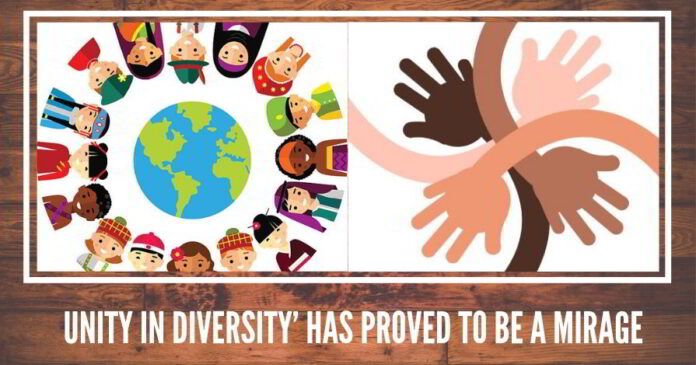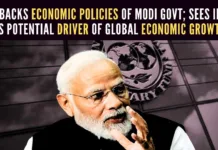
The unity of ideology could not keep the communists politically united, thus leading to the creation of two entities — the Communist Party of India and the Communist Party of India
While delivering the keynote address at an event recently, noted political commentator S Gurumurthy questioned the efficacy of the much-acclaimed slogan, “Unity in diversity’, and suggested that ‘Harmony in diversity’ would be a more apt rallying point, at least in the Indian context. He was speaking at a seminar on the subject, ‘Vasudhaiva Kutumbakam: Relevance of India’s Ancient Thinking to Contemporary Strategic Reality’, organised by the Delhi-based Vivekananda International Foundation.
In the south, parties supposedly united in the Dravidian cause are at loggerheads with each other
It is a valid observation. It was independent India’s first Prime Minister Jawaharlal Nehru who had enthusiastically adopted the ‘unity’ slogan to reflect the ‘oneness’ of India in the midst of various differences in language, region, culture etc. But, like with many other Western concepts that had mesmerised him — his idea of secularism, for instance — this too had problems in fitting into the Indian paradigm.
The Italian Nobel prize winner, Ernesto Teodoro, was the first in modern times to adopt the motto, In Varietate Concordia/In Varietate Unitas. Various others, including nations and societies, later latched on to the bewitching slogan, quite forgetting the impracticality inherent through the oxymoronic expression of ‘unity’ and ‘diversity’. In the Indian context, this impracticality became even more pronounced, though it has failed elsewhere too.
There was unity of religion in Pakistan, and yet the country got divided. There was unity of ideology in the Soviet Union, but the Soviets were fragmented into several independent nations. There is unity of religion in the Islamic world, and still many of them are in violent conflict with one another. Back home, the unity of ideology could not keep the communists politically united, thus leading to the creation of two entities — the Communist Party of India and the Communist Party of India (Marxist).
At the people level in India, there has been no real unity in the face of a diverse nature. Regional conflicts and religious frictions have been common. In the south, parties supposedly united in the Dravidian cause are at loggerheads with each other. This is because we have for decades stressed on ‘unity’, quite forgetting that ‘harmony’ is the key to a conflict-free society. Unity does not necessarily lead to harmony. It’s the other way around — harmony can pave the path to unity, though the caveat is that there is really no need to hanker for a ‘unity’ that does not unite. We have sought to unite without harmonising the various diverse strands of our people.
We, in India, have a diversity of faith. Over the decades, these faiths have strengthened their roots here and some have even been fortified through special laws which ensure the protection of that diversity
The penchant to push for unity has led us to the promotion of another term, ‘tolerance’. It has been presumed that tolerance is the key to unity. Not surprisingly, that too hasn’t worked, because of a flawed understanding of the word. The Cambridge dictionary explains tolerance as follows: ‘Willingness to accept behaviour and beliefs that are different from your own, although you might not agree with or approve of them.’ The Oxford dictionary has this definition:’The ability or willingness to tolerate the existence or behaviour that one dislikes or disagrees with.’ Note here that none of two explanations has the term, ‘respect’, ingrained. This is where the problem lies, not just semantically but also in practice.
Indeed, the origin of ‘tolerance’ has a negative connotation. The Late Middle English referred to tolerance as the ability to bear hardship, or the ability to bear pain and hardship — the Latin Tolerntia provides that reference. In definition after definition, therefore, tolerance is not something that is a voluntary virtue, but a sense of acceptance without one’s heart in it.
One can tolerate pain, but one does not respect it. One can tolerate betrayal, but there is no endorsement of that. Tolerance, therefore, has an element of condescension. If one is tolerant towards another faith, it does not mean that one respects that faith; the limited meaning, both in the books and on the ground (which we see in our lives experiences) is that one lives with it as one would with something unpalatable because circumstances do not offer an option. So long as this state of mind remains, conflicts are inevitable.
When the level of unity is dependent on the level of tolerance which does not inculcate respect, the end result cannot be anything beyond less than inadequate. We ought to have, thus, promoted and publicised over the decades the need to ‘respect’ diversity rather than to ‘tolerate’ it. That respect would have led to a sense of harmony in society — a harmony which, as opposed to unity, could have been a more enduring glue.
We, in India, have a diversity of faith. Over the decades, these faiths have strengthened their roots here and some have even been fortified through special laws which ensure the protection of that diversity. Many spiritual leaders drawn from different faiths have endured to bring about ‘unity’ within and among different belief systems. Yet that unity has been elusive, primarily because the project to harmonise — which imbibes respect, not mere tolerance — has not got the attention it deserves. The key part of harmony is to bring about an agreement despite differences. The Cambridge dictionary defines ‘harmonise’ in the following words: ‘To bring about ideas, feelings, or actions into an agreement or to be a pleasing combination of different parts.’ Oxford dictionary too stresses on the aspect of making something ‘consistent’ or ‘compatible’. Harmony has its origins in music, where various musicians, with their different instruments, string or percussion, eventually get together to produce a single melodious rendition.
Our policymakers, the academia, the media and various other people who have the power to influence, will have to understand the potency of ‘harmony’, and they must stop chasing the mirage of ‘unity’. When even in the West, where cultural diversities within a given nation, are far less as compared to India, ‘unity’ has been a frustrating exercise, why must India continue to walk down that path — especially when the option of ‘harmony’ holds greater potential?











Point to Ponder and laugh …
Finding a proper Name was probably a great challenge for us always?
Is the term ‘unity’ perhaps misunderstood as well?
Muslims have clearly demonstrated their neglect for dharma by separating from Bharat in 1947. Christianity too seems to be opposed to any atmosphere of peace and harmony for humans anywhere in the world by their active conversions, and more so in Bharat.
The religion of love does not compete with the religion of peace.
The missionaries call themselves soldiers of Christ knowing full well that their efforts are essentially criminal in nature. How can there be any peace when one section of humanity is opposed to another in religion.
Only dharma can deliver peace no matter what.
Bramh Mishra
Amend the Constitution retrospectively to ensure that reservation is Only for Hindu obc sc and St as intended originally in the Constitution. The moment there is a conversation the person should lose the privilege. Allow Ghar wapasi for a limited time.
Rajesh Singh’s post reminds me
India that is Bharath.
National Integration songs in TV channels at the backdrop of unpardonable genocide on Sikhs in 1984 and driving out five lakhs Kashmiri Pundits from their own land!
Tolerance-Patience- where Hindu man becoming a mice and it applies only to majority community!
Harmony created freedom of speech abusing PM /compromising our national security by the opposition parties even on a foreign soil !!
‘Unity in diversity’ has proved to be a mirage; let’s instead promote ‘Harmony in diversity. ‘Yes certain faiths already started picking loopholes in laws, CrPC and reinterpreting Articles 14,15,16, 26,27,28……………..Western concepts do not suit us. The Indian judiciary is corrupt. Colonial West Ministers model of governance does not unite us.
In spite of 1200 years of Moghuls rule, 200years Brits rule and 55 years of Nehru- Gandhi corrupt and divide and rule, our ancient nation having faith in SANATANA DHARMA and some DIVINE FORCE residing and presiding in many holy places kept us binding and going.
Harmony in diversity is unlikely to be achieved, especially in a country as diverse as India. There can be disharmony even within a family , whose members are likely to have similar ideologies.Currently there is an existential crisis for India, Indians and the Hindus , which will not create harmony but conflict.
Moreover there has always been economic disharmony in India and other parts of the world, especially in recent history.
The disharmony and conflict will become more evident in years to come, as the population increases.
The populations and its aspirations have increased ,which has not been matched by a parallel increase in resources or jobs.
This unity in diversity or the other way around ” diversity in unity” the age old slogan does not work for Hindus any longer. It was meant for humanity who chose the sanatan way of life.
To day some 50% of the world has rejected this completely. Religions and idealogies with an agenda for power have cropped up over the last few thousand years and they are busy with conversions no matter what it takes, kill if you have to.
For Bharat to go forward we too must understand dharma better and practice it within our own community and give others a choice to come back to the fold or find a new home of their choosing. This clearly is not our problem. Its theirs and it is their responsibility to make the election and leave within a time frame.